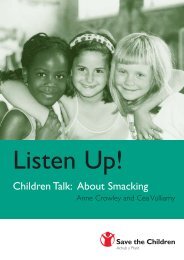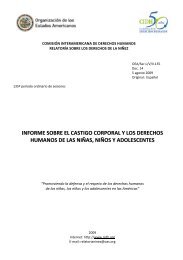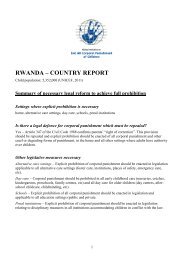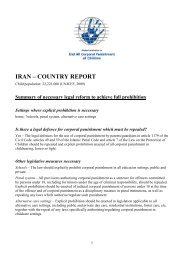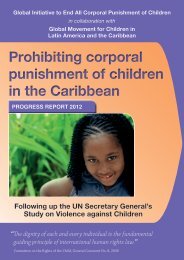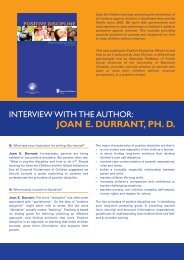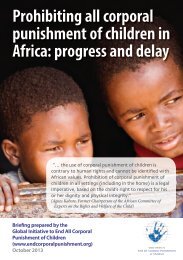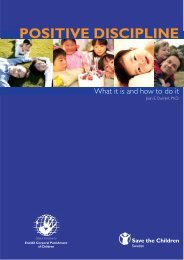Ending corporal punishment of children in Swaziland
Ending corporal punishment of children in Swaziland
Ending corporal punishment of children in Swaziland
- No tags were found...
You also want an ePaper? Increase the reach of your titles
YUMPU automatically turns print PDFs into web optimized ePapers that Google loves.
“My elder brother beat me. He hit me aga<strong>in</strong>st the wall and clappedme. I really don’t know, he likes beat<strong>in</strong>g me and for this I am worried.I f<strong>in</strong>d no peace <strong>in</strong> my life. I feel miserable. I feel sad, and each time Ith<strong>in</strong>k about it I feel sad. I want to commit suicide and never see himaga<strong>in</strong>. I felt like kill<strong>in</strong>g him with my bare hands.”Girl 13-18-year age groupResearch shows that <strong>corporal</strong> <strong>punishment</strong> is not an effective way to ensure change<strong>of</strong> behaviour and discipl<strong>in</strong>e among <strong>children</strong>. If <strong>corporal</strong> <strong>punishment</strong> ‘works’ as adeterrent, it should stop unwanted behaviour among ‘difficult’ <strong>children</strong>. However, ithas been established that <strong>in</strong> schools where <strong>corporal</strong> <strong>punishment</strong> is used, the samelearners are be<strong>in</strong>g beaten for the same <strong>of</strong>fences over and over aga<strong>in</strong>. Classes withthe fewest behavioural problems over time are run by teachers who are committedto non-violent and child-centred approaches to classroom discipl<strong>in</strong>e. 11Corporal <strong>punishment</strong> works aga<strong>in</strong>st the process <strong>of</strong> ethical development. It teaches<strong>children</strong> not to engage <strong>in</strong> a particular behaviour because they will be beaten.It does not teach them to consider the reasons and ethics for not behav<strong>in</strong>g <strong>in</strong> aparticular manner. 12It is also important to remember that a large number <strong>of</strong> <strong>children</strong> engage <strong>in</strong> unwantedbehaviour due to practical problems, for example hunger, thirst, lack <strong>of</strong> rest dueto hav<strong>in</strong>g to walk long distances to school, stressful or abusive family situations,medical problems, or car<strong>in</strong>g for a sick parent and tak<strong>in</strong>g care <strong>of</strong> sibl<strong>in</strong>gs due to theHIV/AIDS pandemic. By us<strong>in</strong>g a ‘quick fix’ such as <strong>corporal</strong> <strong>punishment</strong> and otherforms <strong>of</strong> humiliat<strong>in</strong>g and degrad<strong>in</strong>g <strong>punishment</strong>, an adult might miss the opportunityto deal with the actual problem fac<strong>in</strong>g the child. 13 This might lead to a situationwhere <strong>children</strong>’s rights to food, health care and education are violated <strong>in</strong> additionto their right to physical <strong>in</strong>tegrity.9



